Timeline of Developmental Domains: CI 604 Module 1 Application Task 1
VerifiedAdded on 2022/08/20
|7
|1585
|9
Homework Assignment
AI Summary
This assignment presents a comprehensive timeline of developmental milestones in early childhood, covering the period from birth to eight years of age. The assignment fulfills the requirements of CI 604 Module 1 Application Task 1, which involves creating a timeline that outlines important benchmarks in five key developmental domains: physical, cognitive, adaptive, social and communication, and emotional and language development. The timeline is organized by age groups (birth to 3 months, 3 to 6 months, 6 to 12 months, 12 to 24 months, 24 to 36 months, 3 to 4 years, 4 to 5 years, and 5 to 8 years), providing a clear overview of expected developmental achievements within each domain at different stages of early childhood. The assignment references relevant sources to support the benchmarks, demonstrating an understanding of typical child development. The student's work is structured to be a useful reference for future study, aligning with the assignment's goal of creating an accessible and informative resource. The structure of the document focuses on illustrating key developmental aspects, providing a valuable tool for understanding and tracking child development progress.
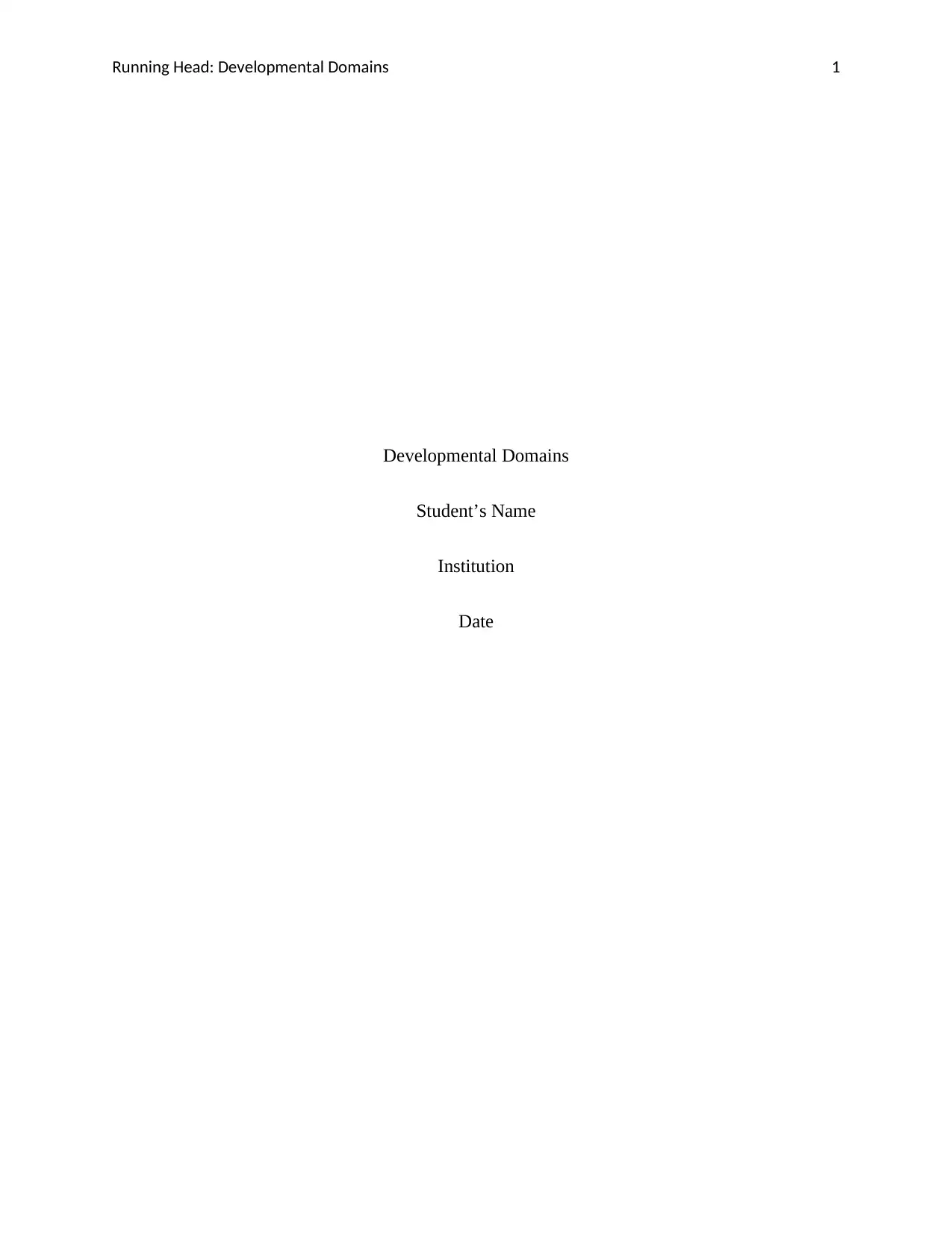
Running Head: Developmental Domains 1
Developmental Domains
Student’s Name
Institution
Date
Developmental Domains
Student’s Name
Institution
Date
Paraphrase This Document
Need a fresh take? Get an instant paraphrase of this document with our AI Paraphraser
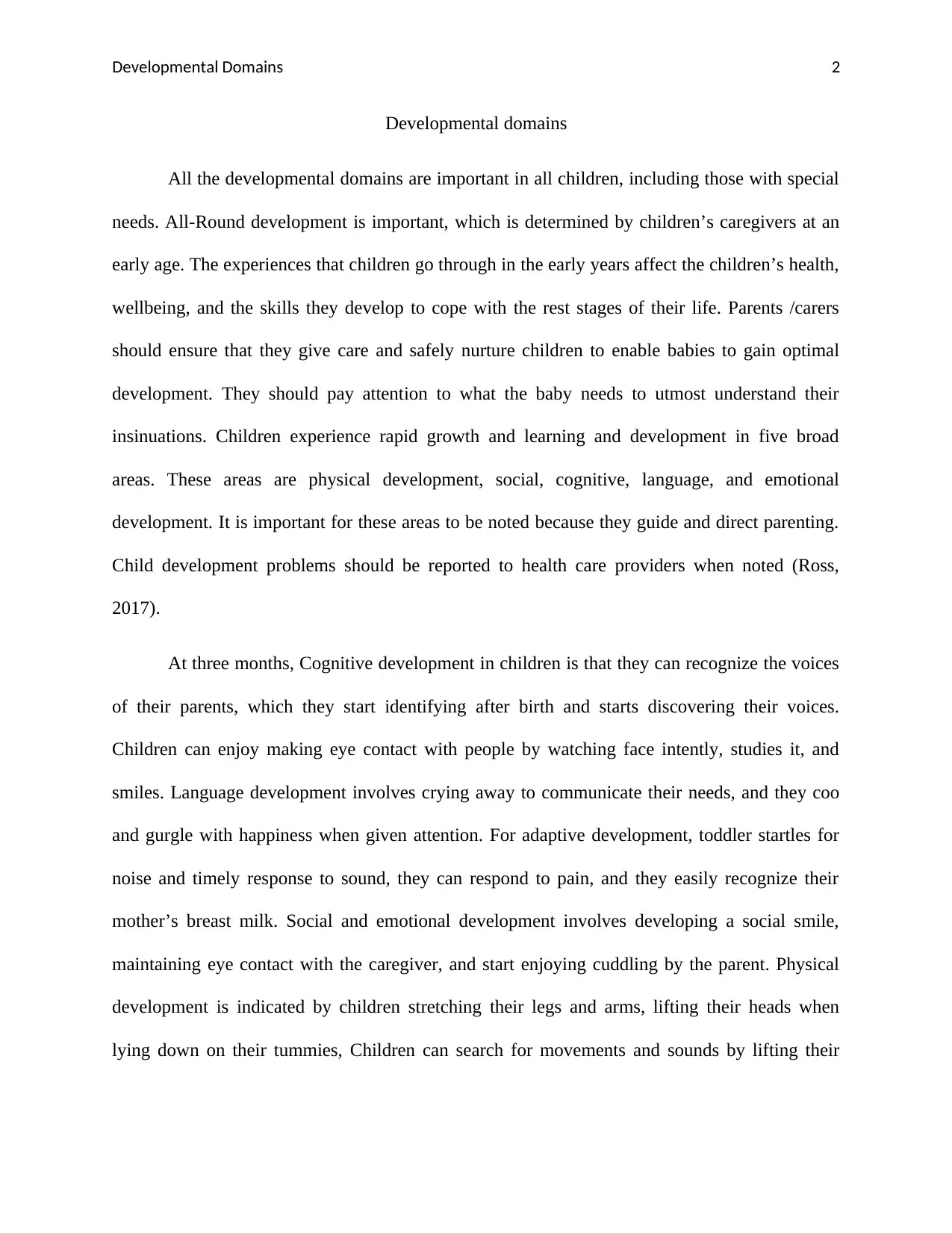
Developmental Domains 2
Developmental domains
All the developmental domains are important in all children, including those with special
needs. All-Round development is important, which is determined by children’s caregivers at an
early age. The experiences that children go through in the early years affect the children’s health,
wellbeing, and the skills they develop to cope with the rest stages of their life. Parents /carers
should ensure that they give care and safely nurture children to enable babies to gain optimal
development. They should pay attention to what the baby needs to utmost understand their
insinuations. Children experience rapid growth and learning and development in five broad
areas. These areas are physical development, social, cognitive, language, and emotional
development. It is important for these areas to be noted because they guide and direct parenting.
Child development problems should be reported to health care providers when noted (Ross,
2017).
At three months, Cognitive development in children is that they can recognize the voices
of their parents, which they start identifying after birth and starts discovering their voices.
Children can enjoy making eye contact with people by watching face intently, studies it, and
smiles. Language development involves crying away to communicate their needs, and they coo
and gurgle with happiness when given attention. For adaptive development, toddler startles for
noise and timely response to sound, they can respond to pain, and they easily recognize their
mother’s breast milk. Social and emotional development involves developing a social smile,
maintaining eye contact with the caregiver, and start enjoying cuddling by the parent. Physical
development is indicated by children stretching their legs and arms, lifting their heads when
lying down on their tummies, Children can search for movements and sounds by lifting their
Developmental domains
All the developmental domains are important in all children, including those with special
needs. All-Round development is important, which is determined by children’s caregivers at an
early age. The experiences that children go through in the early years affect the children’s health,
wellbeing, and the skills they develop to cope with the rest stages of their life. Parents /carers
should ensure that they give care and safely nurture children to enable babies to gain optimal
development. They should pay attention to what the baby needs to utmost understand their
insinuations. Children experience rapid growth and learning and development in five broad
areas. These areas are physical development, social, cognitive, language, and emotional
development. It is important for these areas to be noted because they guide and direct parenting.
Child development problems should be reported to health care providers when noted (Ross,
2017).
At three months, Cognitive development in children is that they can recognize the voices
of their parents, which they start identifying after birth and starts discovering their voices.
Children can enjoy making eye contact with people by watching face intently, studies it, and
smiles. Language development involves crying away to communicate their needs, and they coo
and gurgle with happiness when given attention. For adaptive development, toddler startles for
noise and timely response to sound, they can respond to pain, and they easily recognize their
mother’s breast milk. Social and emotional development involves developing a social smile,
maintaining eye contact with the caregiver, and start enjoying cuddling by the parent. Physical
development is indicated by children stretching their legs and arms, lifting their heads when
lying down on their tummies, Children can search for movements and sounds by lifting their
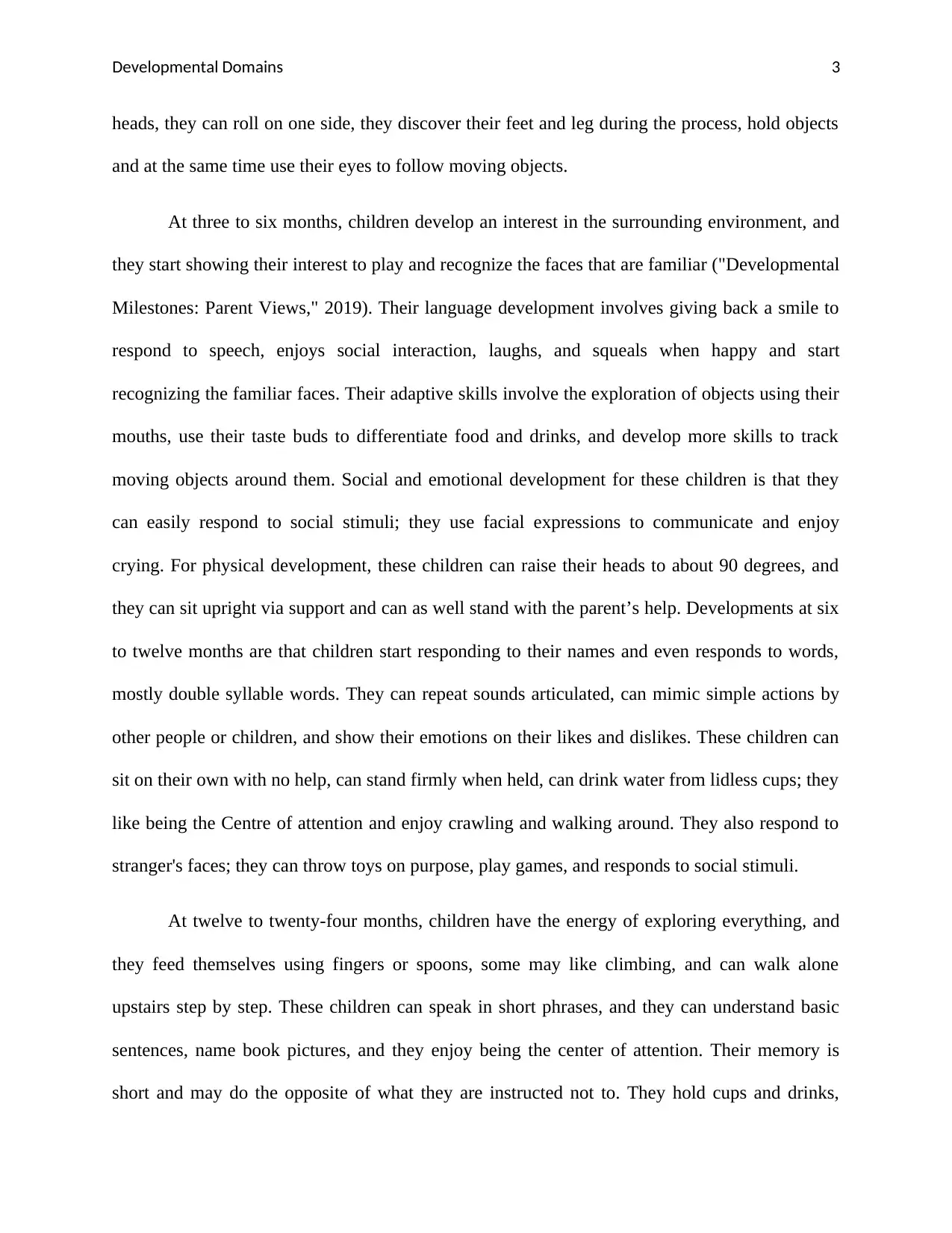
Developmental Domains 3
heads, they can roll on one side, they discover their feet and leg during the process, hold objects
and at the same time use their eyes to follow moving objects.
At three to six months, children develop an interest in the surrounding environment, and
they start showing their interest to play and recognize the faces that are familiar ("Developmental
Milestones: Parent Views," 2019). Their language development involves giving back a smile to
respond to speech, enjoys social interaction, laughs, and squeals when happy and start
recognizing the familiar faces. Their adaptive skills involve the exploration of objects using their
mouths, use their taste buds to differentiate food and drinks, and develop more skills to track
moving objects around them. Social and emotional development for these children is that they
can easily respond to social stimuli; they use facial expressions to communicate and enjoy
crying. For physical development, these children can raise their heads to about 90 degrees, and
they can sit upright via support and can as well stand with the parent’s help. Developments at six
to twelve months are that children start responding to their names and even responds to words,
mostly double syllable words. They can repeat sounds articulated, can mimic simple actions by
other people or children, and show their emotions on their likes and dislikes. These children can
sit on their own with no help, can stand firmly when held, can drink water from lidless cups; they
like being the Centre of attention and enjoy crawling and walking around. They also respond to
stranger's faces; they can throw toys on purpose, play games, and responds to social stimuli.
At twelve to twenty-four months, children have the energy of exploring everything, and
they feed themselves using fingers or spoons, some may like climbing, and can walk alone
upstairs step by step. These children can speak in short phrases, and they can understand basic
sentences, name book pictures, and they enjoy being the center of attention. Their memory is
short and may do the opposite of what they are instructed not to. They hold cups and drinks,
heads, they can roll on one side, they discover their feet and leg during the process, hold objects
and at the same time use their eyes to follow moving objects.
At three to six months, children develop an interest in the surrounding environment, and
they start showing their interest to play and recognize the faces that are familiar ("Developmental
Milestones: Parent Views," 2019). Their language development involves giving back a smile to
respond to speech, enjoys social interaction, laughs, and squeals when happy and start
recognizing the familiar faces. Their adaptive skills involve the exploration of objects using their
mouths, use their taste buds to differentiate food and drinks, and develop more skills to track
moving objects around them. Social and emotional development for these children is that they
can easily respond to social stimuli; they use facial expressions to communicate and enjoy
crying. For physical development, these children can raise their heads to about 90 degrees, and
they can sit upright via support and can as well stand with the parent’s help. Developments at six
to twelve months are that children start responding to their names and even responds to words,
mostly double syllable words. They can repeat sounds articulated, can mimic simple actions by
other people or children, and show their emotions on their likes and dislikes. These children can
sit on their own with no help, can stand firmly when held, can drink water from lidless cups; they
like being the Centre of attention and enjoy crawling and walking around. They also respond to
stranger's faces; they can throw toys on purpose, play games, and responds to social stimuli.
At twelve to twenty-four months, children have the energy of exploring everything, and
they feed themselves using fingers or spoons, some may like climbing, and can walk alone
upstairs step by step. These children can speak in short phrases, and they can understand basic
sentences, name book pictures, and they enjoy being the center of attention. Their memory is
short and may do the opposite of what they are instructed not to. They hold cups and drinks,
⊘ This is a preview!⊘
Do you want full access?
Subscribe today to unlock all pages.

Trusted by 1+ million students worldwide
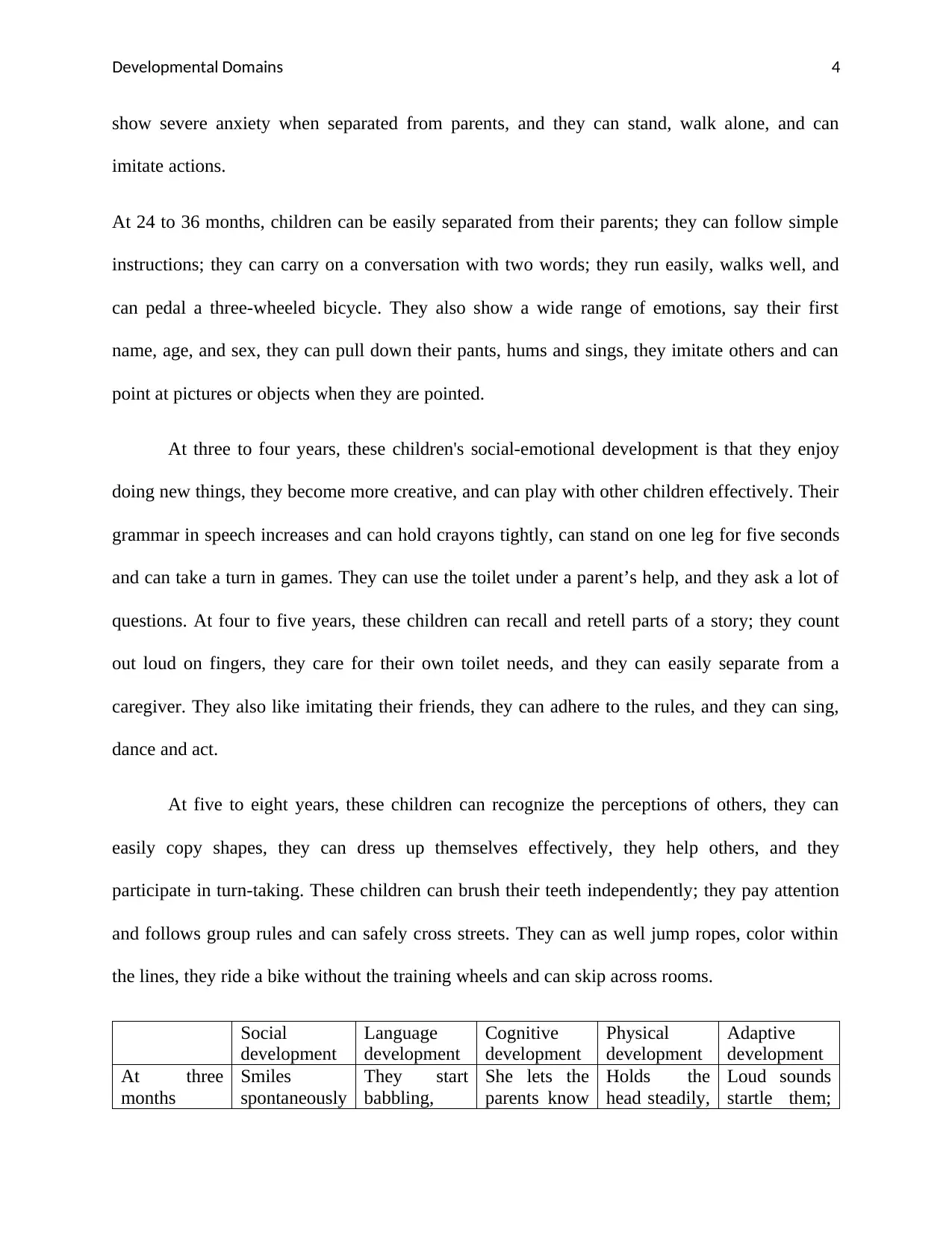
Developmental Domains 4
show severe anxiety when separated from parents, and they can stand, walk alone, and can
imitate actions.
At 24 to 36 months, children can be easily separated from their parents; they can follow simple
instructions; they can carry on a conversation with two words; they run easily, walks well, and
can pedal a three-wheeled bicycle. They also show a wide range of emotions, say their first
name, age, and sex, they can pull down their pants, hums and sings, they imitate others and can
point at pictures or objects when they are pointed.
At three to four years, these children's social-emotional development is that they enjoy
doing new things, they become more creative, and can play with other children effectively. Their
grammar in speech increases and can hold crayons tightly, can stand on one leg for five seconds
and can take a turn in games. They can use the toilet under a parent’s help, and they ask a lot of
questions. At four to five years, these children can recall and retell parts of a story; they count
out loud on fingers, they care for their own toilet needs, and they can easily separate from a
caregiver. They also like imitating their friends, they can adhere to the rules, and they can sing,
dance and act.
At five to eight years, these children can recognize the perceptions of others, they can
easily copy shapes, they can dress up themselves effectively, they help others, and they
participate in turn-taking. These children can brush their teeth independently; they pay attention
and follows group rules and can safely cross streets. They can as well jump ropes, color within
the lines, they ride a bike without the training wheels and can skip across rooms.
Social
development
Language
development
Cognitive
development
Physical
development
Adaptive
development
At three
months
Smiles
spontaneously
They start
babbling,
She lets the
parents know
Holds the
head steadily,
Loud sounds
startle them;
show severe anxiety when separated from parents, and they can stand, walk alone, and can
imitate actions.
At 24 to 36 months, children can be easily separated from their parents; they can follow simple
instructions; they can carry on a conversation with two words; they run easily, walks well, and
can pedal a three-wheeled bicycle. They also show a wide range of emotions, say their first
name, age, and sex, they can pull down their pants, hums and sings, they imitate others and can
point at pictures or objects when they are pointed.
At three to four years, these children's social-emotional development is that they enjoy
doing new things, they become more creative, and can play with other children effectively. Their
grammar in speech increases and can hold crayons tightly, can stand on one leg for five seconds
and can take a turn in games. They can use the toilet under a parent’s help, and they ask a lot of
questions. At four to five years, these children can recall and retell parts of a story; they count
out loud on fingers, they care for their own toilet needs, and they can easily separate from a
caregiver. They also like imitating their friends, they can adhere to the rules, and they can sing,
dance and act.
At five to eight years, these children can recognize the perceptions of others, they can
easily copy shapes, they can dress up themselves effectively, they help others, and they
participate in turn-taking. These children can brush their teeth independently; they pay attention
and follows group rules and can safely cross streets. They can as well jump ropes, color within
the lines, they ride a bike without the training wheels and can skip across rooms.
Social
development
Language
development
Cognitive
development
Physical
development
Adaptive
development
At three
months
Smiles
spontaneously
They start
babbling,
She lets the
parents know
Holds the
head steadily,
Loud sounds
startle them;
Paraphrase This Document
Need a fresh take? Get an instant paraphrase of this document with our AI Paraphraser
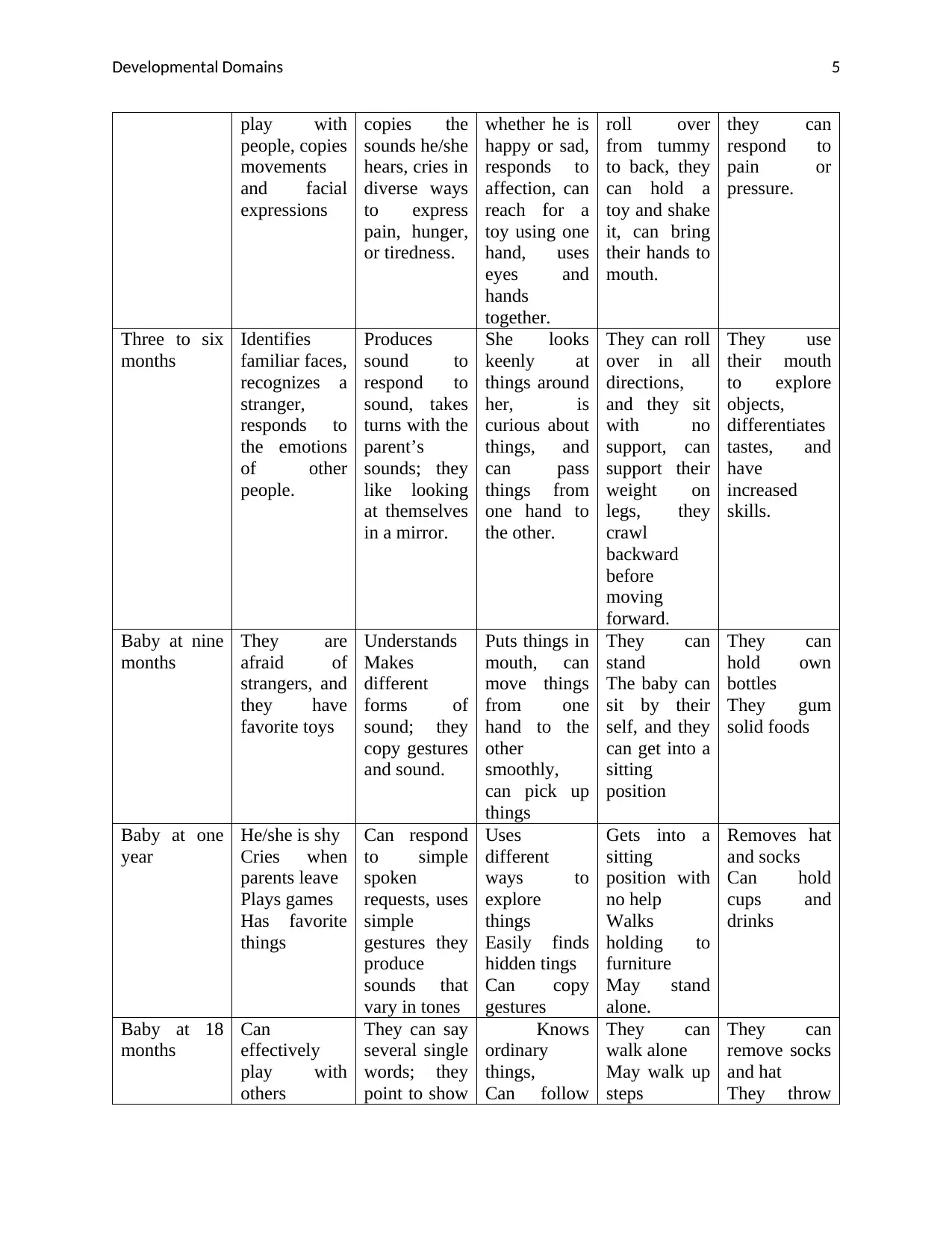
Developmental Domains 5
play with
people, copies
movements
and facial
expressions
copies the
sounds he/she
hears, cries in
diverse ways
to express
pain, hunger,
or tiredness.
whether he is
happy or sad,
responds to
affection, can
reach for a
toy using one
hand, uses
eyes and
hands
together.
roll over
from tummy
to back, they
can hold a
toy and shake
it, can bring
their hands to
mouth.
they can
respond to
pain or
pressure.
Three to six
months
Identifies
familiar faces,
recognizes a
stranger,
responds to
the emotions
of other
people.
Produces
sound to
respond to
sound, takes
turns with the
parent’s
sounds; they
like looking
at themselves
in a mirror.
She looks
keenly at
things around
her, is
curious about
things, and
can pass
things from
one hand to
the other.
They can roll
over in all
directions,
and they sit
with no
support, can
support their
weight on
legs, they
crawl
backward
before
moving
forward.
They use
their mouth
to explore
objects,
differentiates
tastes, and
have
increased
skills.
Baby at nine
months
They are
afraid of
strangers, and
they have
favorite toys
Understands
Makes
different
forms of
sound; they
copy gestures
and sound.
Puts things in
mouth, can
move things
from one
hand to the
other
smoothly,
can pick up
things
They can
stand
The baby can
sit by their
self, and they
can get into a
sitting
position
They can
hold own
bottles
They gum
solid foods
Baby at one
year
He/she is shy
Cries when
parents leave
Plays games
Has favorite
things
Can respond
to simple
spoken
requests, uses
simple
gestures they
produce
sounds that
vary in tones
Uses
different
ways to
explore
things
Easily finds
hidden tings
Can copy
gestures
Gets into a
sitting
position with
no help
Walks
holding to
furniture
May stand
alone.
Removes hat
and socks
Can hold
cups and
drinks
Baby at 18
months
Can
effectively
play with
others
They can say
several single
words; they
point to show
Knows
ordinary
things,
Can follow
They can
walk alone
May walk up
steps
They can
remove socks
and hat
They throw
play with
people, copies
movements
and facial
expressions
copies the
sounds he/she
hears, cries in
diverse ways
to express
pain, hunger,
or tiredness.
whether he is
happy or sad,
responds to
affection, can
reach for a
toy using one
hand, uses
eyes and
hands
together.
roll over
from tummy
to back, they
can hold a
toy and shake
it, can bring
their hands to
mouth.
they can
respond to
pain or
pressure.
Three to six
months
Identifies
familiar faces,
recognizes a
stranger,
responds to
the emotions
of other
people.
Produces
sound to
respond to
sound, takes
turns with the
parent’s
sounds; they
like looking
at themselves
in a mirror.
She looks
keenly at
things around
her, is
curious about
things, and
can pass
things from
one hand to
the other.
They can roll
over in all
directions,
and they sit
with no
support, can
support their
weight on
legs, they
crawl
backward
before
moving
forward.
They use
their mouth
to explore
objects,
differentiates
tastes, and
have
increased
skills.
Baby at nine
months
They are
afraid of
strangers, and
they have
favorite toys
Understands
Makes
different
forms of
sound; they
copy gestures
and sound.
Puts things in
mouth, can
move things
from one
hand to the
other
smoothly,
can pick up
things
They can
stand
The baby can
sit by their
self, and they
can get into a
sitting
position
They can
hold own
bottles
They gum
solid foods
Baby at one
year
He/she is shy
Cries when
parents leave
Plays games
Has favorite
things
Can respond
to simple
spoken
requests, uses
simple
gestures they
produce
sounds that
vary in tones
Uses
different
ways to
explore
things
Easily finds
hidden tings
Can copy
gestures
Gets into a
sitting
position with
no help
Walks
holding to
furniture
May stand
alone.
Removes hat
and socks
Can hold
cups and
drinks
Baby at 18
months
Can
effectively
play with
others
They can say
several single
words; they
point to show
Knows
ordinary
things,
Can follow
They can
walk alone
May walk up
steps
They can
remove socks
and hat
They throw
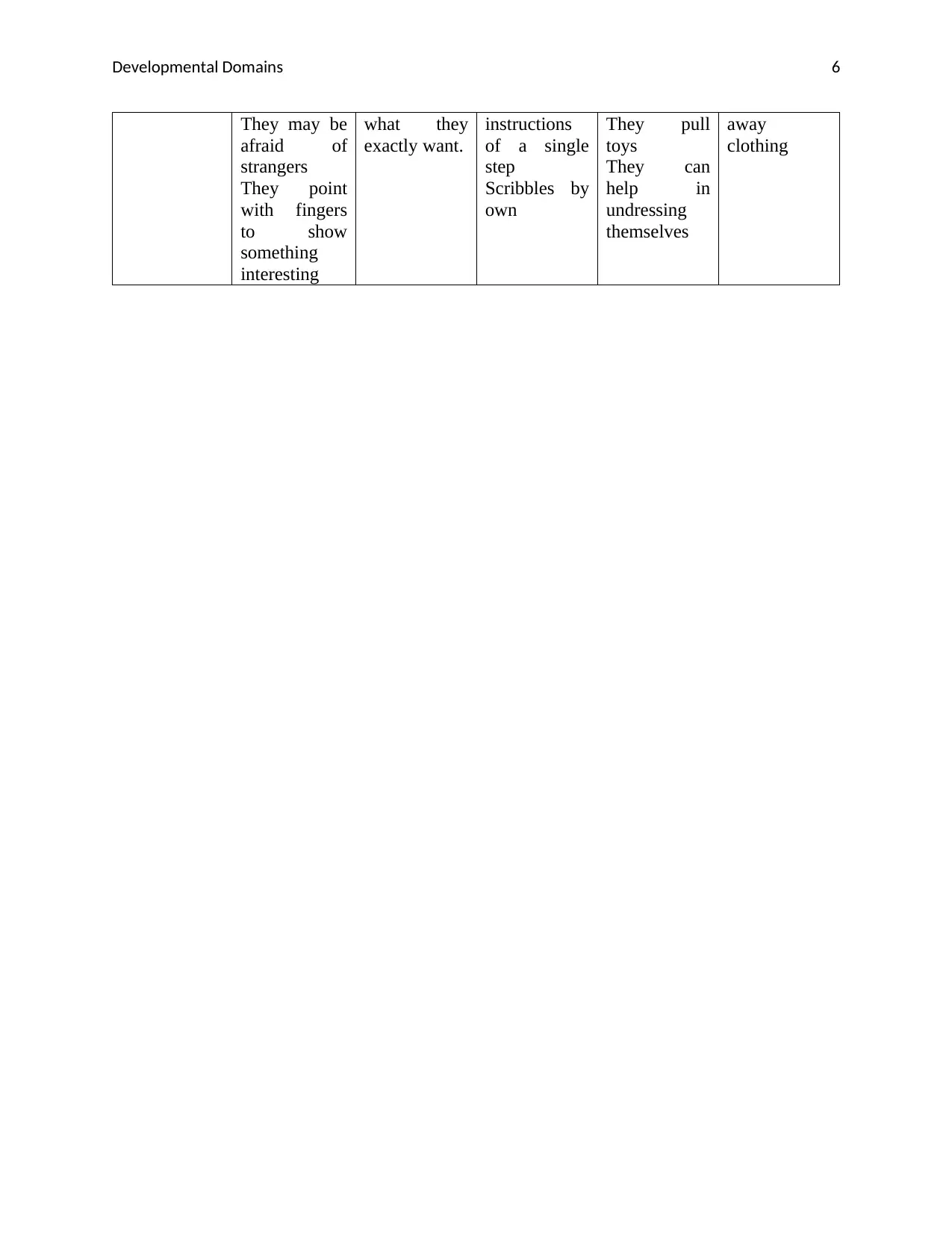
Developmental Domains 6
They may be
afraid of
strangers
They point
with fingers
to show
something
interesting
what they
exactly want.
instructions
of a single
step
Scribbles by
own
They pull
toys
They can
help in
undressing
themselves
away
clothing
They may be
afraid of
strangers
They point
with fingers
to show
something
interesting
what they
exactly want.
instructions
of a single
step
Scribbles by
own
They pull
toys
They can
help in
undressing
themselves
away
clothing
⊘ This is a preview!⊘
Do you want full access?
Subscribe today to unlock all pages.

Trusted by 1+ million students worldwide
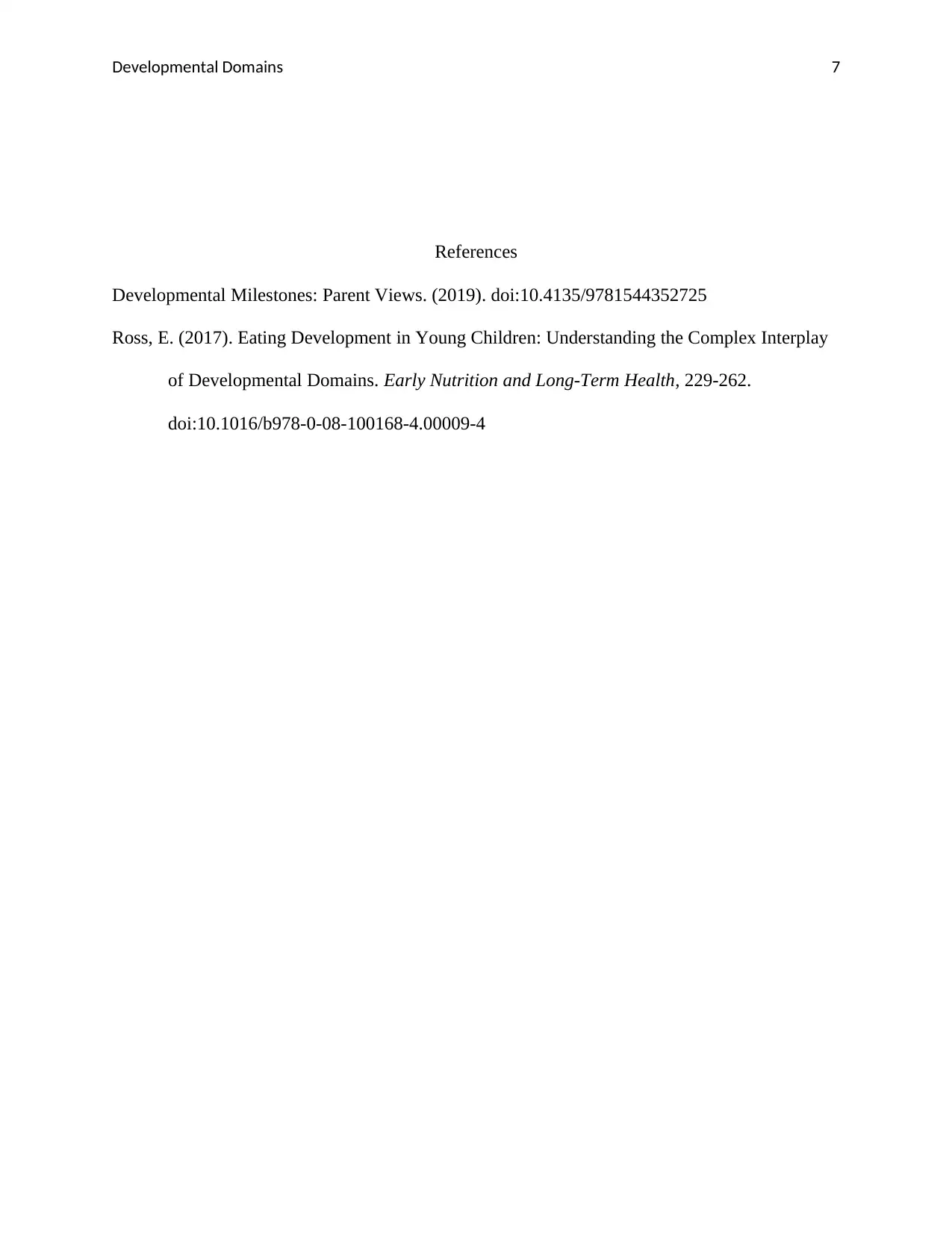
Developmental Domains 7
References
Developmental Milestones: Parent Views. (2019). doi:10.4135/9781544352725
Ross, E. (2017). Eating Development in Young Children: Understanding the Complex Interplay
of Developmental Domains. Early Nutrition and Long-Term Health, 229-262.
doi:10.1016/b978-0-08-100168-4.00009-4
References
Developmental Milestones: Parent Views. (2019). doi:10.4135/9781544352725
Ross, E. (2017). Eating Development in Young Children: Understanding the Complex Interplay
of Developmental Domains. Early Nutrition and Long-Term Health, 229-262.
doi:10.1016/b978-0-08-100168-4.00009-4
1 out of 7
Related Documents
Your All-in-One AI-Powered Toolkit for Academic Success.
+13062052269
info@desklib.com
Available 24*7 on WhatsApp / Email
![[object Object]](/_next/static/media/star-bottom.7253800d.svg)
Unlock your academic potential
Copyright © 2020–2026 A2Z Services. All Rights Reserved. Developed and managed by ZUCOL.





